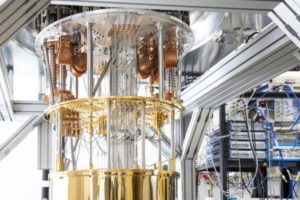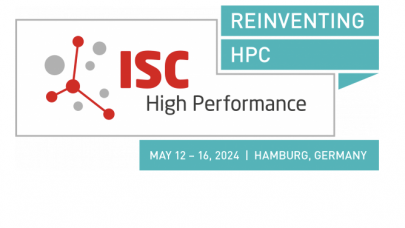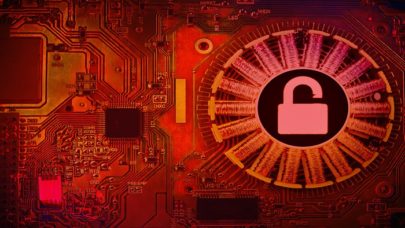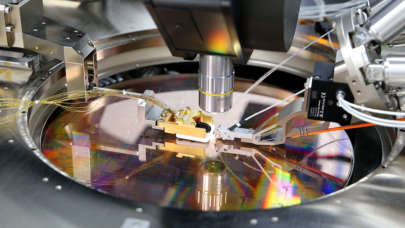JÜLICH, Germany, March 9, 2022 — Building a complete quantum computer based on cutting-edge German technology is the goal of the QSolid collaborative project, which has just started and to which the Federal Ministry of Education and Research has allocated € 76.3 million ($84M USD) in funding for the next five years. The project centers on quantum bits – or qubits for short – of very high quality, i.e. with a low error rate. The quantum computer will be integrated into Forschungszentrum Jülich’s supercomputing infrastructure at an early stage and will contain several next-generation superconducting quantum processors, including a “moonshot” system that has been proven to exceed the computing power of conventional computers. The first demonstrator will go into operation in mid-2024, and will make it possible to test applications as well as benchmarks for industry standards.
 Quantum computers promise breakthroughs in materials and drug development and in optimizing traffic management solutions. In future, they could vastly exceed the capabilities of conventional supercomputers for certain tasks. However, the technology is still in its infancy. Although developing a usable quantum computer comes with enormous challenges, it also offers an opportunity to set industry standards and secure intellectual property rights from the outset.
Quantum computers promise breakthroughs in materials and drug development and in optimizing traffic management solutions. In future, they could vastly exceed the capabilities of conventional supercomputers for certain tasks. However, the technology is still in its infancy. Although developing a usable quantum computer comes with enormous challenges, it also offers an opportunity to set industry standards and secure intellectual property rights from the outset.

Focus on Industrial Applications
To pave the way for commercialization, 25 leading German companies and research institutions have joined forces in the collaborative project QSolid. The research consortium coordinated by Forschungszentrum Jülich is the largest of its kind in Germany. Together, the project partners aim to develop a comprehensive ecosystem for a demonstrator based on superconducting qubits, which will be made accessible to external users via the Jülich UNified Infrastructure for Quantum computing (JUNIQ) and tailored to their individual needs.
Quantum Computers with Diverse Processors
The partners aim to develop a system containing various quantum processors based on next-generation superconducting circuits with a reduced error rate. This approach is regarded as cutting-edge by the international community and is also used by companies such as Google, IBM, and Intel. The multiprocessor machine will be located at Forschungszentrum Jülich, where it will operate at least three different quantum chips in parallel: a “moonshot” system with computing power exceeding that of conventional supercomputers, an application-specific system designed to perform quantum calculations for industry, and a benchmarking platform that prioritizes the development of digital twins and industry standards.

Focus on Qubit Quality
“Our focus is on improving the quality of the quantum bits, a goal we are pursuing on all levels in QSolid,” says Prof. Frank Wilhelm-Mauch from Forschungszentrum Jülich. Qubits’ susceptibility to errors is a sticking point in the development of quantum computers. The quantum states used to store quantum information respond extremely sensitively to external influences. They are often disrupted before all computing operations have been completed.
“The optimizations we have in mind start with next-generation superconducting circuits with a particularly low error rate, which we plan to achieve using high-precision manufacturing methods and new material systems, for example. Other essential elements include optimal control of the qubits as well as state-of-the-art error avoidance methods based on artificial intelligence (AI) on a firmware level, an area in which QSolid aims to set new standards,” explains Wilhelm-Mauch.
Network of Research Institutions
To achieve the ambitious goal of an independent quantum computer manufactured in Germany, QSolid is bringing together research institutions, companies, and start-ups from across the country. Seven subinstitutes from Jülich’s Peter Grünberg Institute are contributing their expertise to the project; the Jülich Supercomputing Centre (JSC), the Central Institute of Engineering, Electronics and Analytics (ZEA-2), and Qruise – a spin-off of Forschungszentrum Jülich – have also taken on a number of important tasks. Other research partners that are contributing valuable specialist knowledge include Fraunhofer IPMS and Fraunhofer IZM-ASSID, Karlsruhe Institute of Technology (KIT), Leibniz IPHT in Jena, the National Metrology Institute (PTB), CiS Forschungsinstitut für Mikrosensorik, and a number of universities including Ulm University, the University of Stuttgart, Freie Universität Berlin, the University of Konstanz, the University of Cologne, and Heinrich Heine University Düsseldorf.
Setting Up a National Supply Chain
Numerous manufacturers and start-ups are involved in setting up a national development and supply chain. ParityQC, HQS, Rosenberger HF-Technik, IQM, supracon, ParTec, Racyics, AdMOS, LPKF Laser & Electronics, Atotech, Atos science+computing ag, Globalfoundries, and Zurich Instruments Germany are participating as project partners, giving them the opportunity to set the first industry standards and exploit the potential of the technology at an early stage.
Quantum infrastructure at Forschungszentrum Jülich
In developing its superconducting quantum architecture, QSolid can draw on the experience of several experts including Prof. Rami Barends, who moved from Google’s research team to Forschungszentrum Jülich last autumn. The next-generation quantum processors will mainly be manufactured in the Helmholtz Nano Facility at Forschungszentrum Jülich. This 1,000-square-metre cleanroom complex run by the Helmholtz Association is equipped with state-of-the-art facilities for the production and characterization of quantum components. By 2025, an additional facility will be built in the form of the Helmholtz Quantum Center (HQC), a specially designed laboratory infrastructure for quantum computing.
First Systems By 2024
The first prototypes of the planned demonstrators in QSolid are being produced at Leibniz IHPT in Jena and are expected to be operational by 2024. A production line for superconducting circuits is already in place at IHPT and will be converted to create a pilot line for superconducting quantum circuits as part of the QSolid project.
Important preliminary work to help achieve the project goals has already been carried out. Results from the European flagship project OpenSuperQ and the collaborative projects DAQC and GeQcos, which were launched in 2021, will be incorporated into QSolid’s activities.
QSolid Project Overview
| Project title | QSolid (Quantum computer in the solid state) |
| Project duration | January 2022 – December 2026 |
| Budget | € 76.3 million (of which 89.8 % is funded by the BMBF) |
| Coordination | Forschungszentrum Jülich, Prof. Dr. Frank Wilhelm-Mauch |
| Partners | Forschungszentrum Jülich (PGI-12-, PGI-2, PGI-8, PGI-11, PGI-13, PGI-3, PGI-9, JSC, ZEA-2), Qruise, Fraunhofer, KIT, IPHT, ParityQC, HQS, Rosenberger, Ulm University, PTB, University of Stuttgart, Freie Universität Berlin, IQM, University of Konstanz, University of Cologne, Heinrich-Heine University Düsseldorf, Supra, ParTec, RI, AdMOS, LPKF, Atotech, Atos, GF, CiS, ZI |
| Website | http://www.q-solid.de |
| https://twitter.com/QSolid_DE |
Further information:
“In Superposition”, article from effzett magazine 1/2021
Focus article “Quantum Technology”
Participating institutes and institute divisions at Forschungszentrum Jülich:
Peter Grünberg Institute, Institute for Quantum Computing Analytics (PGI-12)
Peter Grünberg Institute, Theoretical Nanoelectronics (PGI-2 / IAS-3)
Peter Grünberg Institute, Quantum Control (PGI-8)
Peter Grünberg Institute, JARA-Institute Quantum Information (PGI-11)
Peter Grünberg Institute, Institute for Functional Quantum Systems (PGI-13)
Peter Grünberg Institute, Quantum Nanoscience (PGI-3)
Peter Grünberg Institute, Semiconductor Nanoelectronics (PGI-9)
Jülich Supercomputing Centre (JSC)
Central Institute of Engineering, Electronics and Analytics, Electronic Systems (ZEA-2)
About Jülich Supercomputing Centre
The Jülich Supercomputing Centre at Forschungszentrum Jülich has been operating the first German supercomputing centre since 1987, and with the Jülich Institute for Advanced Simulation it is continuing the long tradition of scientific computing at Jülich. Computing time at the highest performance level is made available to researchers in Germany and Europe by means of an independent peer-review process. At the time being, JSC operates one of the most powerful supercomputers in Europe, JUWELS.
Source: Jülich Supercomputing Centre


























































